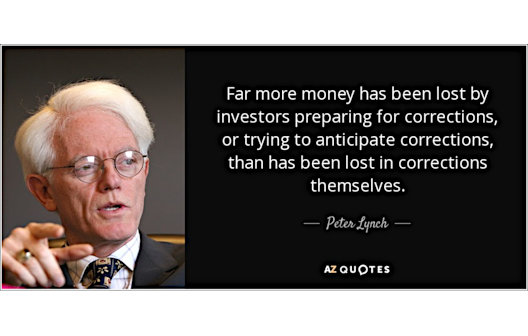Image Credit: Marie LaFauci
Is the Tide Turning on Equity Investors?
The Federal Reserve has been accommodating economic growth since at least 2008. A broad stock market bet against the Fed during this 13-year period would have been like trying to swim against the tide. Only in 2018 did the market (S&P 500) have a negative return. The dip that year was in response to fiscal policies, including trade tariffs.
Last week the Fed released minutes from an FOMC meeting held three weeks earlier. These meetings are where Fed governors decide on the stance of monetary policy, making money easier or tighter within the economy. Within the minutes it was clear that the Fed viewed the job market to be near statistically peak levels; they also discussed shrinking their balance sheet. In other words, money that was put into the market to help lower rates and stimulate growth through bond purchases would be unwound by selling securities which has the effect of taking money out of the economy. One reason the market reacted so abruptly is that Fed Chairman Jerome Powell gave a statement to reporters after that meeting, as he normally does, and did not mention this seemingly important change in thought back then.
By the end of last week (January 7), the Nasdaq had fallen 4.5%, the S&P 500 had fallen 1.9%, and the Russell 2000 Small-Cap index by 2.8%. During the Fall of 2020, the Fed chairman presented inflation as not a concern, “transitory” is how he described any pricing strength. Many market watchers at the time saw inflation as more than fleeting and a potential problem. But, not unlike mentioned earlier, going against the Fed can be costly. So, the market did not react to the many forecasts of higher inflation and rates.
Investment Style Shifts
During the period from 2008 until the present, not all sectors or stocks participated in the strong market growth. One only has to look at a comparative chart of the energy sector to realize this. As the Fed begins to step on the economic brakes, there will be sectors and stocks that either benefit from the changed financial situation or have a strong enough product and management team to prosper despite the less accommodative stance of the Fed. Investing in the broader market may be detrimental.
Identifying the sectors poised for growth in a weakened market and the stocks within the sectors that have the greatest opportunity now has increased importance. This may be a dramatic shift for those that have been investing for only a dozen or fewer years. During this time stock fundamentals seemed less important in the selection process than just making sure one was in the market. The truth is fundamental analysis of the various industries and companies within those industries has always been important, it’s just that short-cuts like just climbing aboard an index fund for the ride were easy and rewarding.
Were likely to go through a period where strong economic news is viewed as bad because it could mean a need to accelerate rate hikes, and bad economic news is bad because the Fed isn’t likely to back off even when there are pockets of weakness.
Looking Forward
Very successful investors have been warning against mismatched valuations in indexed funds for a couple of years. These “mismatches” have only broadened since then. Now may be the time for those that believed indexed funds offered diversification to understand that this is less true now than ever before. Also, better understand what you’re buying and the growth potential of individual companies. For example, as of Thursday (January 6), 38% of Nasdaq stocks had fallen 50% or more from their 52-week highs. The benchmark was only down by 5.7% from its all-time high. This is because of the heavy weighting of big tech that remained strong. These stocks mask the underlying weakness of the other companies in the index. Should their massive valuations come more in line with historical norms, they could pull down the index significantly.
Take-Away
The tone of the last Fed meeting, based on the minutes, indicates a more rapid change in direction at the Fed. This has already roiled markets that have been benefitting from years of increasingly accommodative policy. As the tide turns, finding the sectors with the better prospects and the specific stocks within those sectors will require a little more diligence. If you have not already done so, we continue to recommend registering, at no cost, for Channelchek emails; these include research by top-ranked equity analysts and insightful articles on various industries, markets, and economic activity.
Managing Editor, Channelchek
Suggested Reading:
 Is the Index Bubble Michael Burry Warned About Still Looming?
|
 Index Funds May Still Fall Apart over Time
|
 Peter Lynch Echoes Michael Burry’s Warning Over Index Fund Investments
|
 Why Michael Burry has Better Opportunity Than Cathie Wood
|
Sources:
https://www.federalreserve.gov/newsevents/pressreleases/monetary20220105a.htm
https://www.barrons.com/articles/stock-market-tech-stocks-federal-reserve-51641603791
Stay up to date. Follow us:

|

